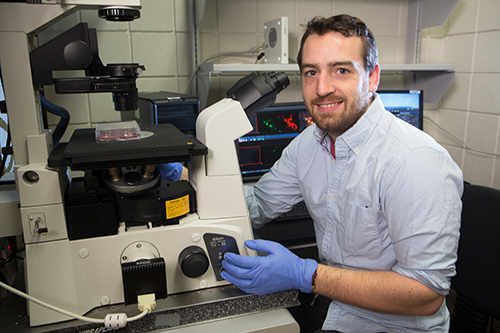David Lee is a University of Arkansas doctoral student researching ways exercise can work on a molecular level to help prevent the onset of chronic diseases such as diabetes. The goal of his research is find ways to fight these diseases.
Lee is studying the interaction of skeletal muscle with metabolic diseases, including diabetes. He conducts his research in the Integrative Muscle Metabolism Laboratory directed by Nicholas Greene, assistant professor of exercise science in the College of Education and Health Professions. Greene's lab is part of the Human Performance Laboratory on campus.
Eventually, the research could help in the development of drugs to treat diabetes but that wouldn't be Lee's first choice.
"Lots of the same ways we control disease with drugs can be mimicked with exercise," he said. "If exercise can fix the problem instead of drugs, we want to know."
Lee has made several conference presentations and contributed to other articles but this is the first time for him to be first author on an article describing this research. The article in the Journal of Cellular Biochemistry is online now.
"I'm looking at how proteins are created and destroyed within muscle," he said. "An imbalance between creating and destroying proteins is what is problematic in metabolic diseases."
Lee, who also earned his master's degree in exercise science from the U of A, is studying a tiny molecule called a microRNA that controls the balance between protein creation and destruction and is found to be modified in people with diabetes.
"Many people are studying this microRNA as it is involved in cancer, but we're one of the first labs to look at it in connection with diabetes," Lee said.
The research involves genetically modifying a gene in rodent muscle cells to artificially change how much of the microRNA is at work to see how it effects the balance of protein creation and breakdown, he explained.
His research suggests that, in diabetic, or insulin-resistant, muscle, the amount of a particular microRNA decreases, resulting in creating more protein at the same time that less protein is destroyed. Lee said when the balance is off like that, the net result is more protein in the muscle. That's interesting to researchers because it has been found that, for people with diabetes, exercise does not have the same effect as on people without the metabolic disease.
"Their response to exercise is different," Lee said. "They don't build muscle like we would expect."
Lee said he is interested in this line of research because people were not dying of chronic diseases 50 years ago at the same rate they are today. That also means funding is available for research in this field.
When he finishes his doctorate in three years, Lee wants to work in an academic setting.
"I like teaching and I like combining research and teaching," he said. "You can teach what you are studying because that's what is really of interest to you."
Topics
Contacts
Heidi Wells, director of communications
College of Education and Health Professions
(479) 575-3138,
